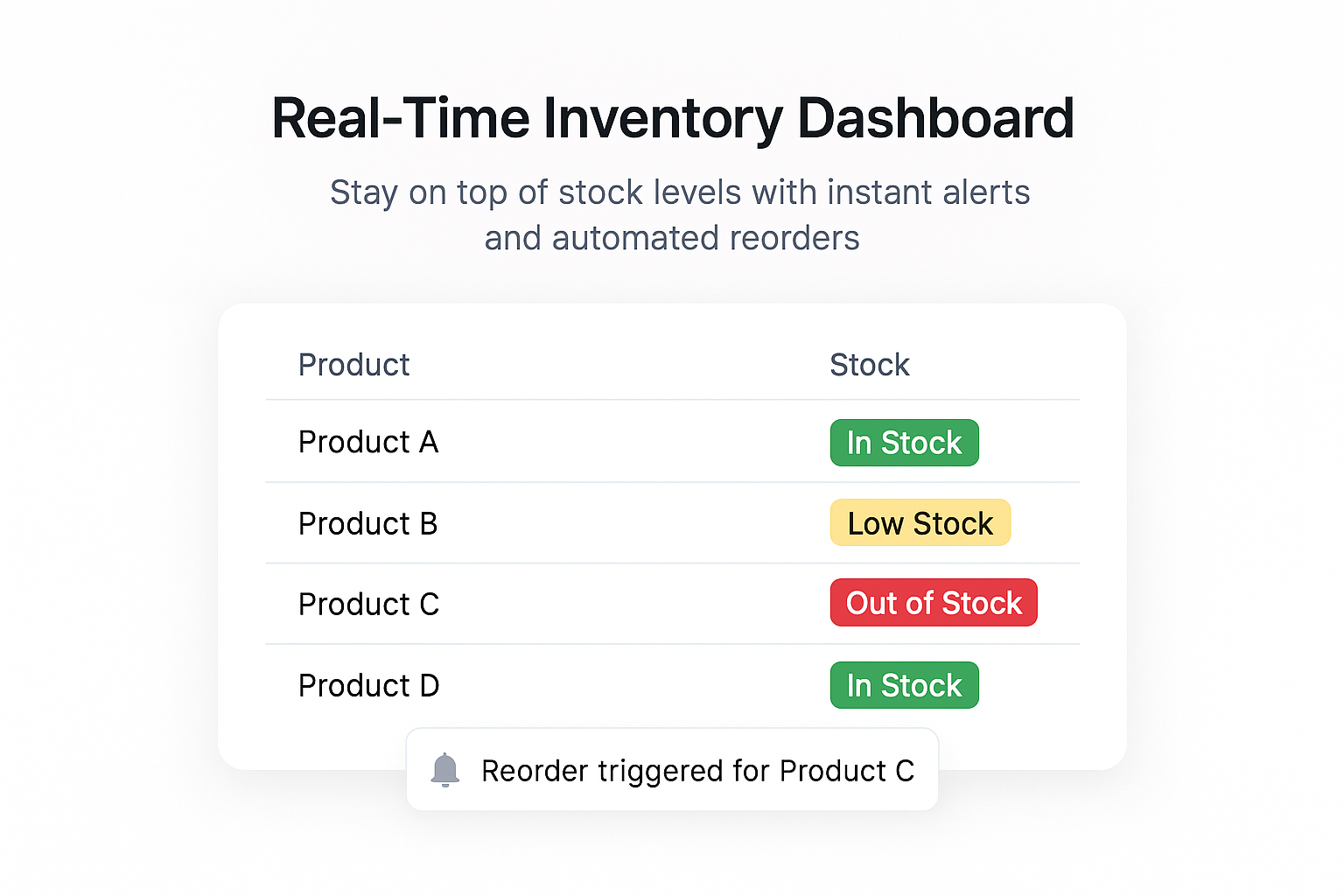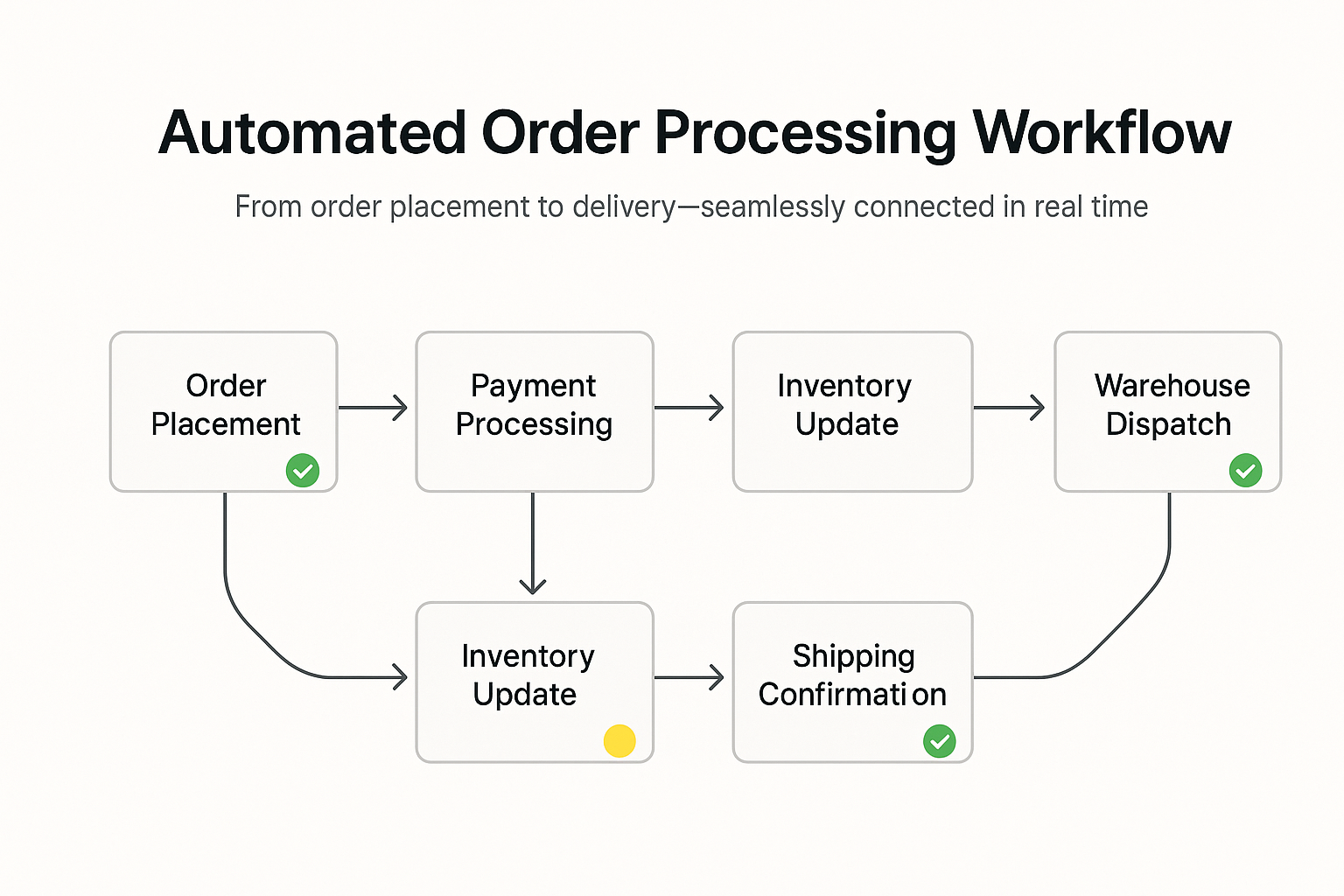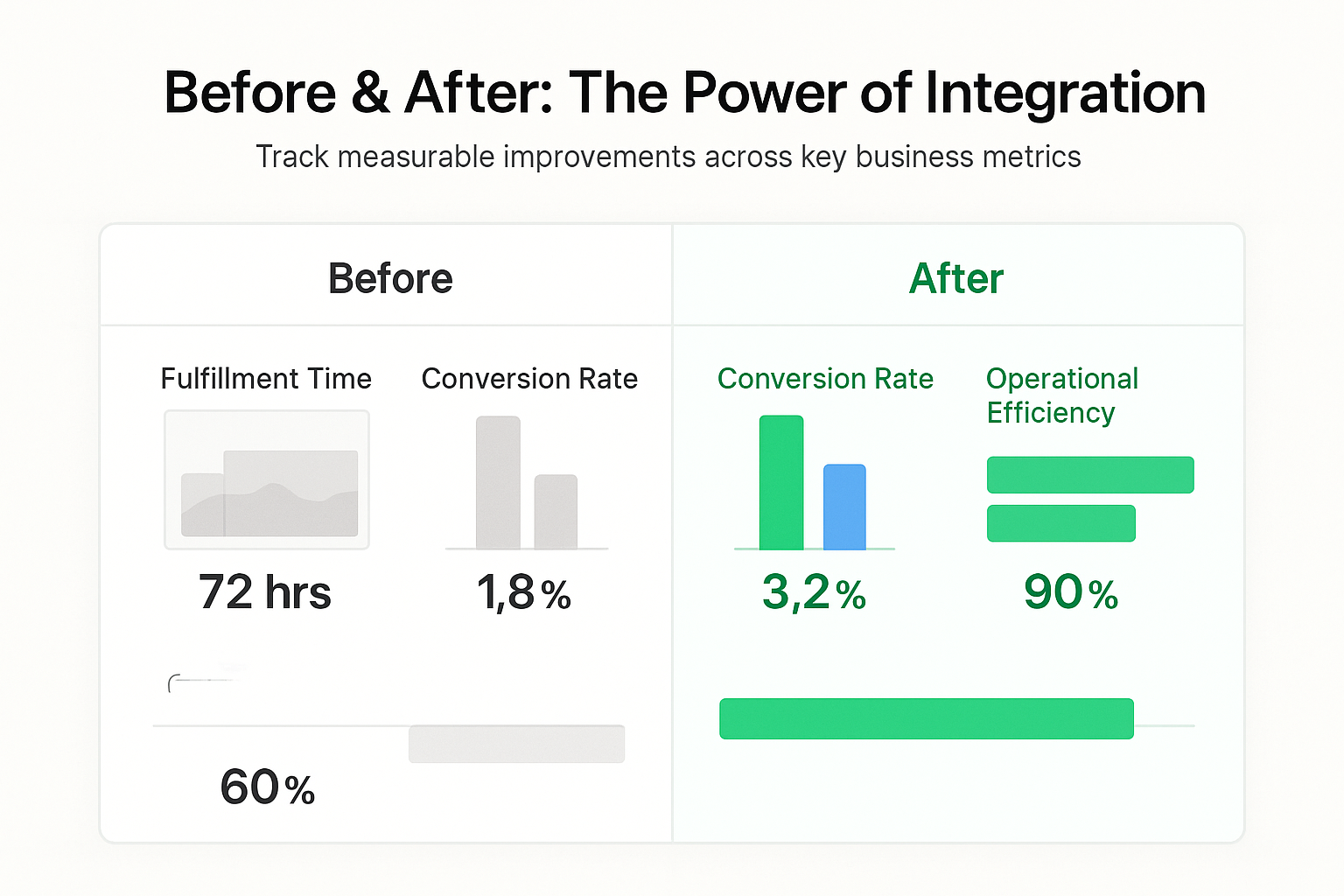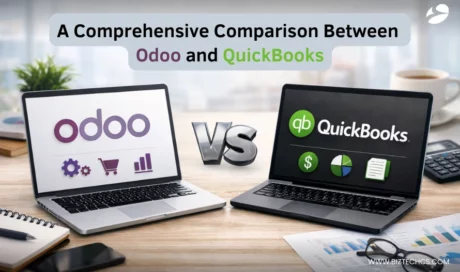966
How Integrated Inventory and Order Processing Can Eliminate Operational Chaos?
5 min read
966
5 min read

You’ve built a thriving e-commerce business in the UAE’s fast-growing digital marketplace. Orders keep rolling in, your marketing campaigns are hitting their mark, and growth looks unstoppable. But behind the scenes, things aren’t as smooth as they seem. Your team is struggling with disconnected systems, excessive manual tasks, and a constant stream of customer complaints about delayed shipments. This is especially critical when 70% of online shopping carts are abandoned globally, often due to inventory mismatches or payment friction (source)
That was exactly the situation for a consumer electronics retailer in Dubai, who came to us at BiztechCS. Their CEO summed it up perfectly: “We’re growing so fast that our systems can’t keep up. How can we bring everything—inventory, order fulfillment, and payments—into one platform so we stop making mistakes and start delivering the experience our customers expect?”
If that sounds familiar, you’re not alone. The Dubai Chamber of Commerce projects that the UAE’s e-commerce market will hit US$9.2 billion by 2026—a rapid growth trajectory that highlights both the opportunity and the operational complexity retailers must manage to stay competitive (source).
The electronics retailer we worked with was experiencing what we call “success syndrome”—growing so quickly that their foundational systems couldn’t scale with demand. Their e-commerce platform operated in isolation from their inventory system, creating a perfect storm of operational challenges:
One of their customer service representatives captured the frustration perfectly: “Customers often place orders for products that we don’t have in stock, or their payments are not processed properly. This is affecting our reputation.”
This is where BiztechCS can step in with a proven approach. We can create a unified ecosystem where inventory, orders, and payments communicate seamlessly in real-time. Our experience tells us that when your e-commerce systems operate in silos, every order becomes a potential point of failure.
A common concern we hear from business heads is, “Won’t integrating systems be disruptive when we’re already busy managing growth?” The truth is, the disruption comes from not integrating—manual firefighting consumes far more resources than phased integration ever would.
As we often ask our clients during initial consultations: How often do you find yourself manually checking inventory levels against online orders? If the answer is “frequently,” it usually signals stock mismatches that frustrate customers and erode trust. Are your team members spending more time on administrative tasks than strategic growth activities? If so, that’s a clear indicator that manual work is consuming resources better spent on scaling the business. These questions don’t just highlight inefficiencies—they help us pinpoint where integration can free up capacity, reduce errors, and redirect your team’s focus to growth-driving priorities.
Ready to discover how integrated systems can turn operational challenges into growth opportunities? BiztechCS partners with you to understand your business needs and design a scalable solution that evolves alongside your success.
The first step in our Odoo for e-commerce integration approach focused on eliminating the root cause of most fulfillment issues: inventory disconnection. At BiztechCS, we can implement Odoo inventory management for e-commerce that serves as the single source of truth for stock levels across all channels. Here’s how we approach it:
We configure Odoo’s Inventory module to create bidirectional communication between the e-commerce platform and the warehouse management system. When a customer places an order online, the system immediately:
At this stage, many retail owners ask, “But what if the system sells stock we don’t physically have?” That’s exactly why real-time synchronization exists—Odoo instantly updates availability across every channel, preventing overselling and protecting customer trust.
Odoo Consultant Tip: We often advise clients to configure buffer stock rules inside Odoo. By setting aside a small percentage of inventory as a safety net, you avoid overselling during peak demand or flash sales—common pain points for UAE e-commerce retailers.

During implementation, if a CEO asks, “Can we automate stock alerts for low stock items to ensure we never run out of popular products?” BiztechCS can implement intelligent forecasting features such as:
At BiztechCS, we know that real-time inventory updates with Odoo aren’t just about preventing stockouts—they can create predictable cash flow and reduce carrying costs. CEOs often ask, “But won’t automation lock us into rigid rules?” In fact, Odoo forecasting is flexible—it learns from sales trends and seasonal demand, so it adapts instead of forcing static processes.
When you can accurately forecast demand, you can optimize working capital. This insight comes from our experience helping dozens of UAE retailers transform their operations.
We frequently find that businesses struggle to predict which products will run out of stock, leaving them to play catch-up with emergency orders. This reactive approach costs significantly more than proactive inventory management.
With inventory synchronization established, BiztechCS can turn its attention to Odoo order processing automation. Our goal is always to eliminate manual touchpoints that create delays and errors in the fulfillment process.
We integrate Odoo’s Sales module directly with the e-commerce platform, creating an automated pipeline that handles every step from order placement to customer delivery:
Order Placement → Inventory Reservation → Invoice Generation → Fulfillment Notification → Shipping Coordination
Each step happens automatically, with human intervention only required for exception handling or quality control checkpoints. Naturally, operations managers ask, “If everything’s automated, how do we handle special cases or urgent orders?” The system is built with exception handling rules—so while 90% of orders flow automatically, flagged cases can be routed to humans instantly without slowing the rest.
Odoo Consultant Tip: As Odoo consultants, we encourage businesses to set up “priority tags” in order workflows. For example, VIP customer orders or urgent replacement orders can bypass regular queues, ensuring faster delivery without breaking the automation chain.

Not all orders are created equal. BiztechCS can configure the system to automatically prioritize orders based on:
This intelligent routing ensures that high-value customers receive expedited service while optimizing warehouse efficiency for all orders.
In our experience implementing Odoo for UAE e-commerce retailers, the magic happens when your systems make smart decisions without human intervention. The solution works particularly well because it can handle the complexity of multichannel selling while remaining flexible enough to adapt to local market requirements.
During our consultation process, we typically ask: How many manual steps are currently involved in processing a typical order from your website? Could you confidently process orders if your key team members were unavailable? The answers often reveal significant vulnerability in business continuity planning.
The final piece of BiztechCS’s integration puzzle involves implementing robust Odoo payment processing for e-commerce that eliminates manual reconciliation errors and reduces fraud risk.
We connect Odoo’s Accounting module with multiple payment gateways popular in the UAE market, including:
Every payment is automatically matched to its corresponding order, with the system flagging any discrepancies for manual review. The CFO noted the transformation: “With Odoo, payment tracking is fully automated, and we can easily see which payments are pending or completed, all linked to the orders.”
BiztechCS also incorporates:
Finance leaders sometimes ask, “But will integrating multiple gateways complicate reconciliation?” In reality, Odoo simplifies it—payments from every gateway are automatically matched to orders, creating one clean, reconciled view of revenue across channels.
Odoo Consultant Tip: When configuring payment gateways in Odoo, we suggest enabling automated test environments first. This allows finance teams to simulate high-volume transactions and detect mismatches early—avoiding costly surprises in live operations.
From our experience at BiztechCS, payment processing isn’t just about collecting money—it’s about creating trust. When customers see professional, secure, and seamless checkout experiences, they’re far more likely to complete their purchase and return for future orders.
In fact, a 2024 Baymard Institute survey highlighted by PayPal found that 22% of consumers abandon their carts because the checkout process is too long or complicated, while 13% leave when their preferred payment method isn’t available (source). This makes it clear that integrated, flexible payment systems aren’t just operational upgrades—they’re revenue protectors.
By automating reconciliation, reducing fraud risks, and ensuring every customer has the payment option they prefer, BiztechCS helps e-commerce businesses turn payment processing into a growth driver.
Within 60 days of implementing our phased Odoo for e-commerce integration approach, the electronics retailer experienced dramatic improvements across all key metrics:

The most telling feedback came from their customer service manager, who said, “We went from putting out fires all day to proactively helping customers. Our team can focus on building relationships instead of explaining delays.”
This transformation exemplifies how BiztechCS approaches every client engagement—not just solving immediate problems, but creating foundations for sustainable growth and competitive advantage.
What makes this transformation story particularly relevant for UAE e-commerce retailers is how BiztechCS can ensure the integrated system scales with business growth. As the electronics retailer expanded into new product categories and sales channels, their Odoo foundation adapted seamlessly.
BiztechCS’s integrated system now supports:
Operating in the UAE requires compliance with VAT, import duties, and consumer protection regulations. BiztechCS’s Odoo implementation includes:
At BiztechCS, we believe the beauty of Odoo for UAE e-commerce retailers lies in its ability to handle local compliance requirements while maintaining the flexibility to expand regionally or globally as the business grows. And it’s natural for executives to ask, “What happens when we add more sales channels or expand abroad?” The system is designed to scale—adding new platforms, currencies, or tax rules doesn’t require rebuilding; it simply extends your existing foundation.
Curious whether your current systems are truly built to handle the UAE market demands? BiztechCS offers a no-obligation assessment to uncover gaps, highlight opportunities, and map a clear path toward sustainable growth.
Every e-commerce business reaches a crossroads where manual processes and disconnected systems become barriers to growth instead of temporary solutions. The question isn’t whether you’ll need integrated systems—it’s how quickly you can implement them before operational challenges impact your market position.
BiztechCS helps businesses recognize when they’re experiencing:
Our methodology focuses on:
During our initial consultations, we ask: If you could eliminate one operational pain point that’s currently limiting your growth, what would it be? This question helps BiztechCS prioritize implementations for maximum impact.
The UAE’s e-commerce landscape offers incredible opportunities for retailers willing to invest in operational excellence. But success requires more than just good products and marketing—it demands systems that can scale with your ambitions while delivering consistently excellent customer experiences.
At BiztechCS, we know how Odoo for e-commerce integration transforms not just operations, but entire business trajectories. We help UAE e-commerce retailers build the technological foundation needed to compete effectively in an increasingly sophisticated marketplace.
Whether you’re processing 50 orders a day or 5,000, the principles remain the same: integrated systems, automated processes, and real-time visibility create the operational excellence that drives sustainable growth.
Ready to see how integrated systems could eliminate complexity and unlock efficiency across your e-commerce operations? At BiztechCS, we know no two businesses face the same challenges, which is why we design phased, scalable solutions that align with your workflows and growth ambitions.
All product and company names are trademarks™, registered® or copyright© trademarks of their respective holders. Use of them does not imply any affiliation with or endorsement by them.

Artificial Intelligence (AI)
201
By Nandeep Barochiya

Odoo
265
By Uttam Jain

Artificial Intelligence (AI)
505
By Nandeep Barochiya